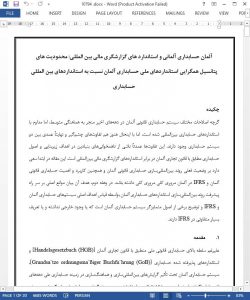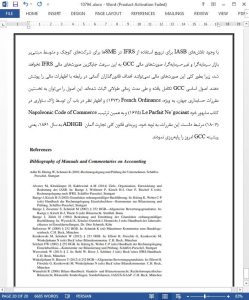Abstract
Although several reforms of the German statutory accounting system in the last decades led to a moderate but ongoing harmonization with international accounting standards, there still remain significant—hence deliberate—differences between the two accounting systems. These differences mainly result from fundamental disparities in the underlying purposes and principles of accounting according to the German Commercial Code vs. IFRS. The article provides an overview of the current status of internationalization of German statutory accounting as well as the application and importance of German statutory accounting and of IFRS in Germany. Second, it aims to show the main obstacles for a further internationalization of German accounting standards by comparing the main purposes of the German and the IFRS accounting systems and by explaining some central characteristic principles of the German accounting system, which either do not exist or have a substantially different interpretation in the IFRS.
1 Introduction
Despite the prevailing relevance of national statutory accounting according to the German Commercial Code [Handelsgesetzbuch (HGB)]1 and the Generally Accepted Accounting Principles [Grundsa¨tze ordnungsma¨ßiger Buchfu¨hrung (GoB)], the German accounting system was not unaffected by the global internationalization and harmonization tendencies in the field of accounting during the last decades. Since the 1980s, several significant harmonization reforms of the German accounting system resulted mainly from the implementation of the Fourth, Seventh and Eighth Directives of the European Union. However, there still remained significant differences between the national accounting systems of EU member states due to the existence of numerous accounting options for member states and different national interpretations of the regulations in the directives. These differences mainly result from fundamental disparities in the underlying aims, purposes and principles of the different national accounting systems, which in turn result from substantial disparities in cultural features of societies and their legal systems and traditions. Therefore, the degree of harmonization in a manner consistent with principles of national sovereignty is limited.
6 Summary and Outlook
Although the Bilanzrechtsmodernisierungsgesetz (BilMoG) led to a moderate and partial alignment of GCC accounting rules with IFRS rules, there still remain some significant—hence deliberate—differences. These differences mainly result from the different purposes of financial statements in the two accounting systems. GCC Germany. German Accounting and IFRS: Limitations in the Convergence... 277 financial statements have to serve three equally ranked purposes (documentation, stewardship, capital maintenance), whereas IFRS financial statements are solely intended to fulfill the purpose of providing decision useful information. The characteristic purpose of capital maintenance of GCC financial statements leads to a much greater role of the concept of creditor protection compared to IFRS. This guiding concept is manifested in a row of characteristic principles regarding the determination of a prudent but comparable and objective profit, which in turn are codified in numerous valuation and measurement provisions in the GCC. Moreover, the purpose of capital maintenance also forms the basis of the close link between GCC financial statements and tax accounts by permitting only the realization of sufficiently objectified profits. In Sect. 5 we explained the three most important principles of the GCC regarding the prudent determination of annual profits and showed how these principles lead to considerably different accounting treatments compared to IFRS rules.










